Stay in the know on all smart updates of your favorite topics.
Demoday #28: Designing for Circularity in the Port of Amsterdam

During Demoday #28, we focused on one of the key challenges in the circular transition: how can we make the Port of Amsterdam fully circular?
The Amsterdam port is one of the largest in Europe. It functions as a major energy hub, where fossil fuels still play a central role, and as an industrial hub, where massive flows of raw materials pass through. The City of Amsterdam has set the ambitious goal of becoming fully circular by 2050. This means the port must transform as well. This is a complex and far-reaching task that requires collaboration and innovation.
In this work session, we zoomed in on circular design: how can we make products and processes circular from start to finish?
A closer look at the port
James Hallworth, Commercial Manager at Port of Amsterdam, opened the session by taking the group on a tour through the world of the port. Located in the western harbour area, the port has two main responsibilities. First, it ensures the smooth and safe handling of all maritime traffic on behalf of the City of Amsterdam. Second, it manages and develops the land and industrial areas around the harbour.
To tackle circularity, Port of Amsterdam applies industrial ecosystem thinking. In nature, waste does not exist, and the same principle should apply here. The port aims to build collaborative networks between companies, where waste flows from one company becomes raw materials for another. There is already significant activity around recycling and recovery, but more can be done in higher-value strategies on the R-ladder, such as repurposing, remanufacturing, and refurbishment. Circular by design is a key concept in this shift.
The port is transitioning from measuring success in tons to measuring added value. This shift also means thinking differently about space: circular systems require space to receive, process, and recover valuable materials from waste streams.
Getting hands-on with circular design
Creating a fully circular production process is easier said than done. That’s why we worked through two real-world cases: construction materials and e-bikes. Participants split into groups and explored what a truly circular production process might look like. We also explored the potential role the port could play as an enabler of circular supply chains.
Some key takeaways from the session:
• Material passports: A digital document containing material properties and origin can greatly simplify recycling and reuse.
• Monomaterials: Products made from a single type of material are much easier to separate and recycle at the end of life.
• Smart synergies: Mapping which companies can use each other’s waste flows as input can unlock huge circular potential.
• Financial incentives: Right now, circular processes are often more expensive than linear ones. Smart financial mechanisms could help bridge that gap.
• E-bike challenges: In the case of e-bikes, batteries were flagged as a challenge. Recycling them is still very difficult, and since they are mostly produced outside of Europe, it’s hard to have control over the production process.
This session invited participants to take a step back and view products through a circular lens. The port has the potential to become a key player in the circular transition, but to get there, it will need ideas, insights, and input from across the network.
<strong>Do you have ideas on how the Port of Amsterdam can become more circular? Or would you like to contribute to future sessions? Get in touch with Noor at noor@amsterdaminchange.com. A big thank you to James Hallworth from Port of Amsterdam for bringing this challenge to the network, and Yanti Slaats (Amsterdam University of Applied Sciences) for moderating the session.</strong>
Building local mini-economy within planetary boundaries

Scroll naar beneden voor de Nederlandse versie
Growth is an end in itself, dictates the current economic model. For only growth would keep our economy going and be indispensable to further sustainability. At the same time, our planet is being depleted by this drive for green growth.
Is it time to abandon economic growth as a social ideal? And then what are workable, more social alternatives?
More and more business owners are opting for sustainable operations. They settle for less financial gain to do valuable work with positive social and environmental impact. The rise of the commons movement, housing-, energy- and food cooperatives, as well as social initiatives in health and welfare, show that people want to stand together for values other than financial gain.
Achievable and real alternatives
New economic models offer different perspectives for considering the economy as part of a society. They offer tools to make that economy more equitable and sustainable. Yet the new economic thinking is still often dismissed as unrealistic and unachievable. Only by trying out these theories in practice can we demonstrate that these are real alternatives.
New economic thinking, New economic acting
To experiment with new economic theory and models in practice, the Amsterdam Economic Board has started the New Economic Models exploration. In April, we introduced the living lab project “New Economic Thinking, New Economic Acting” at the Marineterrein in Amsterdam. In this we work on socio-economic experiments, together with AMS Institute, AHK Culture Club, And The People, Bureau Marineterrein, Kennisland, The Next Speaker and the knowledge coalition ‘Art, Tech & Science’.
The Marineterrein is the ideal place to do this because it is an official experiment site. Moreover, companies located here are often already working on circular and social projects. Cultural institutions and organisations at the Marineterrein, in turn, can represent what thriving without economic growth could look like and fuel our desire for a new economy.
-----------------------------------------------------------------------------------------------------------------------
Bouwen aan lokale mini-economie binnen planetaire grenzen
Groei is een doel op zich, dicteert het huidige economische model. Want alleen groei zou onze economie draaiende houden en onmisbaar zijn om verder te verduurzamen. Tegelijkertijd raakt onze planeet uitgeput door die drang naar groene groei.
Wordt het tijd om economische groei als maatschappelijk ideaal los te laten? En wat zijn dan werkbare, socialere alternatieven?
Steeds meer ondernemers kiezen voor een duurzame bedrijfsvoering. Zij nemen genoegen met minder financiële winst om waardevol werk te kunnen doen, met positieve sociale en ecologische impact. De opkomst van de commons-beweging, woon-, energie- en voedselcoöperaties en maatschappelijke initiatieven in zorg en welzijn, laten zien dat mensen zich samen sterk willen maken voor andere waarden dan financieel gewin.
Haalbare en reële alternatieven
Nieuwe economische modellen bieden andere perspectieven om de economie als onderdeel van een samenleving te beschouwen. Ze bieden handvatten om die economie rechtvaardiger en duurzamer in te richten. Toch wordt het nieuwe economisch denken nog vaak weggezet als onrealistisch en niet haalbaar. Alleen door deze theorieën in de praktijk uit te proberen kunnen we aantonen dat dit reële alternatieven zijn.
Nieuw economisch denken, Nieuw economisch doen
Om te kunnen experimenteren met nieuwe economische theorie en modellen in de praktijk, verkent Amsterdam Economic Board deze in de verkenning Nieuwe economische modellen. In april introduceerden we het proeftuinproject ‘Nieuw economisch denken, Nieuw economisch doen’ op het Marineterrein in Amsterdam. Hierin werken we aan sociaaleconomische experimenten, samen met AMS Institute, AHK Culture Club, And The People, Bureau Marineterrein, Kennisland, The Next Speaker en de kenniscoalitie ‘Art, Tech & Science’.
Het Marineterrein is de ideale plek om dit te doen, omdat het een officieel ‘experimentterrein’ is. Bovendien zijn de hier gevestigde bedrijven vaak al bezig met circulaire en sociale projecten. Culturele instellingen en organisaties op het Marineterrein kunnen op hun beurt verbeelden hoe bloei zonder economische groei er uit kan zien en ons verlangen aanwakkeren naar een nieuwe economie.
Reducing Carbon Footprints: Erasmus MC Leads the Way to Climate-Neutral Hospitals
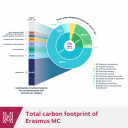
The healthcare sector is responsible for approximately 7% of all greenhouse gas emissions in the Netherlands. How can a hospital become climate-neutral?
The first step on the sustainability journey is to measure the organization’s carbon footprint. A precise carbon footprint is crucial for setting impactful and realistic targets, and for aligning with regulations and Green Deal Healthcare 3.0.
In support of Erasmus Medical Center's sustainability goals to reduce its CO2e emissions by 55% by 2030 and to achieve climate neutrality by 2050, Metabolic mapped its carbon footprint, focusing on scope 1, 2, and 3 emissions.
💡A sneak peek: 60% of Erasmus’ CO2e footprint results from indirect emissions from purchased goods and services, such as medicines.
Erasmus MC is one of the first hospitals to use this method to map emissions across all its operations. This research provides the hospital—and the entire sector—with insights into emission hotspots and highlights potential areas for impactful sustainability interventions.
Explore Metabolic's work with Erasmus in the link below
Interested in learning more about carbon footprint assessment? This is for you: https://bit.ly/3UUdMHf
#sustainability #carbonfootprintassessment #environmentalimpact #sustainablehealthcare
Recycling start-up Droppie has announced their first recycling hub in Amsterdam

Droppie, the innovative recycling start-up, is gearing up to open its first recycling hub in Amsterdam starting June 2024.
At Droppie, we're on a mission to make the world a cleaner place by adding value to recyclables. We've developed a unique collection system and a handy mobile app that rewards users for responsibly recycling all sorts of materials, from textiles to plastics to e-waste!
Bag it. Drop it. Cash it.
Stay tuned for more updates as we countdown to our official launch. Get ready to join us on this exciting journey as we continue to innovate, grow, and make a difference together!
Unlocking circular innovation: Launch of the Circular Innovation Collective program guide

Exciting news! We're happy to announce the launch of the Circular Innovation Collective program guide!
Launched during the #WeekofCircularEconomy2024, the guide is a practical roadmap for local governments to foster circular innovation within their cities and regions.
Gathering insights from its first pilot program in the Metropolitan Region Amsterdam, the guide offers practical and comprehensive instructions for scoping out, designing, and executing local innovation programs. Here’s what Egon van Wees from Amsterdam Impact said about the program:
"To transition to an impact economy we need to radically change our approach. We need to work with front runners and entrepreneurs that tackle societal challenges and influence the broader ecosystem. With the CIC approach you can do just that.” - Egon Van Wees, Program Coordinator, Amsterdam Impact (CIC program Funder).
Wanting to empower other cities and regions across Europe, the CIC is sharing its FREE program guide to accelerate the transition to the new circular economy.
Download the guide in the link below
The Circular Innovation Collective is a consortium of impact-driven organizations initiated by Metabolic, Impact Hub Amsterdam, and Bankers without Boundaries. With the support of the City of Amsterdam (Amsterdam Impact), The DOEN Foundation, and Goldschmeding Foundation, this initiative specifically targeted achieving 70% circular textiles in the Metropolitan Region Amsterdam by 2030. Demonstrating the potential for impactful change, CIC is now dedicated to sharing its knowledge, experience, and strategies in an open-source manner.
#circularinnovationcollective #circularcities #ventures
Exploring Smart Parking Solutions in Amsterdam: The Role of Mobypark in Shaping Urban Efficiency

The quest for parking in Amsterdam presents a unique set of challenges, including narrow lanes, constant vehicular flow, and strict parking policies. This iconic city, celebrated for its canal system, historical buildings, and cultural vibrancy, also faces the modern urban dilemma of parking scarcity. Amidst these challenges, Amsterdam's approach to parking, characterized by a zonal system with variable rates, mirrors its commitment to promoting sustainable urban mobility. Within the bustling heart of the city, parking fees can soar to €7.50 per hour, a pricing strategy designed to incentivize public transport and biking, cherished and eco-friendly travel methods among the locals.
Amsterdam's dynamic parking strategy also paves the way for innovative solutions like Mobypark, a platform revolutionizing parking by facilitating the rental of private parking spots. This initiative not only offers a cost-effective alternative to the traditional parking hunt but also optimizes the use of existing spaces, aligning with the city's sustainability goals.
For those seeking affordability without sacrificing convenience, Amsterdam's Park and Ride (P+R) facilities serve as a beacon. Strategically located at the city's periphery, these parking havens offer reduced rates, encouraging drivers to park their vehicles and hop on public transport to reach the city's core. This system significantly mitigates urban congestion and lowers parking costs for both tourists and daily commuters.
The allure of P+R locations is undeniable, especially when juxtaposed with the exorbitant costs of street parking. To access P+R discounts, users must integrate their parking with public transportation, highlighting the city's efforts to weave sustainability into the fabric of urban travel. Mobypark's P+R options stand out for their simplicity and affordability, offering seamless access to the city center without the usual prerequisites. Examples include:
Amsterdam's strategy to curtail on-street parking availability is a deliberate move towards fostering a more sustainable, pleasant cityscape. By endorsing alternatives like public transport, cycling, and Mobypark's innovative parking solutions, Amsterdam is making strides in reducing traffic jams, cutting down on pollution, and improving urban life quality. These initiatives are testament to Amsterdam's dedication to a sustainable future, highlighting Mobypark's pivotal role in transforming the city into a smarter, more navigable urban space.
Find a link to Mobypark here: Amsterdam parking
Demoday #22: Navigating eco-emotions: The impact of working in sustainability on your mental wellbeing
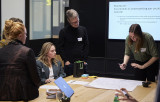
Professionals in the field of circularity and sustainability may experience "eco-emotions," a spectrum of feelings which can have both negative and positive effects on mental health. Eco-emotions arise from ecological crises, such as climate change, and can lead to stress, fatigue, and a sense of powerlessness, but also heightened motivation for professionals.
This work session, led by Marian Zandbergen (CIRCOLLAB, HvA) and moderated by Mareille de Bloois (Royal HaskoningDHV) on the 14th of December, explored the challenges and opportunities associated with eco-emotions, both personally and within organizations. The key question addressed was: How can individuals and organisations constructively manage eco-emotions, and what implications does this have for organisations?
Defining eco-emotions
Eco-emotions are feelings resulting from ecological crises, which can be categorized into backward-looking and forward-looking emotions.
- Backward-looking eco-emotions: include eco-guilt, eco-grief, and eco-anger about past events, such as feeling guilty about the carbon footprint of a vacation flight.
- Forward-looking eco-emotions: encompass eco-anxiety, and focus on current and anticipated future decisions. While eco-anxiety can drive proactive engagement with ecological issues, excessive amounts may lead to feelings of helplessness.
Negative eco-emotions can thus harm your mental health and can even lead to burnout. Therefore, it is important to use strategies to counter the negative effects of eco-anxiety.
Changing attitudes - taking action
Attitudes shape behaviour, and self-efficacy—the belief in one's ability to contribute to problem-solving—is crucial. Concrete action perspectives empower individuals, fostering a sense of control over problems and mitigating feelings of helplessness of eco-anxiety.
Social support - acting as a group
Collaborative efforts within a group can positively impact perceived self-efficacy. Strong collaboration can turn negative effects of eco-anxiety into positive outcomes. Trust and shared motivation play vital roles in effective collaborations, fostering understanding across personal and organisational perspectives.
In the group - recognition and solutions
The participants of the workshop shared personal experiences of eco-emotions and brainstormed constructive ways to incorporate these emotions into circular transition collaborations. Ideas included conducting organizational research to understand the extent of eco-emotions and gain insight into personal motivations in businesses and collaboration, and demonstrating how intrinsic beliefs contribute to shared goals.
Proposed solutions
To address eco-emotions within organizations, various methods were proposed, including workshops with inspiration and practical applications, an HR framework, 'meet & share' sessions featuring talks with industry leaders, and personal purpose hours.
Marian expressed a desire to continue researching this topic, inviting contributions through qualitative interviews within organizations. Are you interested in contributing to this research, please let me know in the comments, or email me at noor@amsterdamsmartcity.com.
Minecraft Almere Pampus Challenge: pushing the boundaries to build the city of the future

In today's dynamic landscape, the key to success lies in collaboration. The Green Innovation Hub firmly believe in the power of partnerships between companies, government and educational institutions to drive innovation, growth and positive change. In a world where technology connects us in unique ways, the Minecraft Almere Pampus Challenge exemplified the power of communities coming together to achieve remarkable feats.
It's inspiring to witness the incredible work of our young talents. They are the architects of the future and they're currently building virtual cities where companies can find their next digital solutions. Whether you represent a company, government department, or educational institution, we invite you to connect and explore how we can collaborate to make a meaningful impact on our shared goals.
1. Fresh Perspectives: young talent brings fresh and innovative perspectives to the table. They're unafraid to challenge the status quo and reimagine how things can be done.
2. Cutting-Edge Tech: these virtual cities are powered by the latest technologies from Microsoft and Iamprogrez. Companies can tap into this tech-savvy generation to incorporate cutting-edge solutions into their operations.
3. Collaboration Opportunities: collaborating with these digital pioneers can lead to mutually beneficial partnerships. Your company can gain a competitive edge while offering mentorship and growth opportunities to the next generation.
Find the Green Innovation Hub (NL Pavilion) at the Smart City Expo World Congres in Barcelona, and let's meet each other. Together, we'll keep pushing the boundaries of what's possible in the Minecraft universe and to build the house – or even the city of the future. Also stay tuned for upcoming advantures, events and challenges on our channels.
Watch the video: https://youtu.be/4F7CFGfb2HE
Demoday #21: Bringing Circularity to Small and Medium-Sized Businesses

Drawing by Govert van der Heijden from Flatland
The city of Amsterdam has ambitious circular goals, aiming to halve its resource usage by 2030. This corresponds to a yearly reduction in material use of the size of 15 Amsterdam Arenas. Collaboration amongst stakeholders, including small and medium-sized businesses (SMBs), is necessary to meet this target. In a work session, the focus was on engaging SMBs in the circular transition.
Ambitions and Strategy of the City of Amsterdam (Mariska Joustra):
The City of Amsterdam aims to reduce its use of new raw materials by 50% by 2023 and become fully circular by 2050. Using the Monitor Circular Economy, Amsterdam tracks its progress in the circular economy, enabling them to develop a strategy to achieve their ambitious objectives.
One of the key points of this strategy is to shift the focus from the city's organization to "Collaborating with the City" to better support entrepreneurs in the circular transition. Examples of how they try to achieve this are:
- Initiatives such as scaling up sustainable artificial turf fields through a significant procurement process.
- Using circular procurement as a means of encouraging companies to provide circular products.
- Mandating at least 20% of new construction to be timber-based.
- Offering a circular assessment to local manufacturers, allowing them to explore steps towards greater circularity.
“Rode Draden Raport” from the Versnellingshuis (Gabrielle Werkhoven):
The Versnellingshuis is an organisation that aids entrepreneurs in advancing circular business practices. Each year, they produce a Red Threads (Rode Draden) report that outlines the key issues in the circular economy. Their focus is on mobilizing the entire supply chain, which can be challenging. Process facilitators are vital for fostering circularity throughout the entire chain. Provinces like Noord-Holland and Zuid-Holland have lists of such facilitators to assist in making the entire chain more circular.
However, challenges persist, as the costs and benefits can vary significantly between different chain participants, making it difficult to implement systemic changes fairly.
Panel Discussion
Following the presentations, a discussion took place involving Jack Stuifbergen (MKB Nederland), Julius Heyning (Gekko), and Joanne Lucas (HvA), who represented the SMB sector. They highlighted the following key points regarding challenges and opportunities:
- Existing strategies, initiatives, and tools tend to benefit circular frontrunners within the SMB sector, often leaving the rest behind.
- Entrepreneurs often face legal obstacles in their sustainability efforts.
- Entrepreneurs need more financial incentives to transition to circular business models. The concept of "true price" could make a significant difference.
- Many entrepreneurs find it challenging to determine how to make their business more sustainable, particularly in sectors like software, where the environmental impact is not readily apparent.
- The Corporate Sustainability Reporting Directive (CSRD) offers significant opportunities for increasing circularity. It is crucial to ensure that SMBs are well-informed about the implications of this legislation.
Anne Schaap (MVO Nederland), Kornelis de Jong (municipality Haarlemmermeer), Gabrielle Werkhoven (Versnellingshuis), and Mariska Joustra (municipality of Amsterdam) discussed their efforts to support entrepreneurs:
- Simplifying the concept of circularity to emphasize resource savings and optimize logistics.
- Hosting events to educate SMBs about circularity, offering a platform for frontrunners in circularity.
- Collaborating with organisations like Triodos to assist entrepreneurs.
The consensus of the discussion was that more needs to be done to make circularity a pressing concern for the average SMB, their sense of urgency needs to be increased on this issue. More can be done for the front-runners as well because even though they receive considerable support, they still face legal and collaborative challenges.
This question was introduced in the Amsterdam Smart City network by Mariska Joustra from gemeente Amsterdam. The session was prepared with and moderated by Roos Kramer from Royal HaskoningDHV. Do you have any questions or input for us? Contact me via noor@amsterdamsmartcity.com or leave a comment below.
Harnessing Bio-Based Construction to Beat Carbon Budgets and Preserve Our Planet

The construction sector is projected to exceed its carbon budget by 2026 using current construction practices.
But by constructing half of new residential buildings with bio-based materials, we can actually reduce CO2 emissions by 18% by 2030. That’s according to Metabolic's latest research, made possible through funding from Built by Nature. And if we consider carbon sequestration, we can even reduce the impact of the residential construction sector by 52%.
However, if solely focusing on carbon, we must be mindful not to shift the burden to other planetary boundaries. In our research, we discuss topics such as sustainable wood supply, climate change risks, and land use change. Based on our findings, we propose six steps to consider to realize a sustainable biobased construction sector.
Join SEWF23 week (9-13 October) in Amsterdam

The Social Enterprise World Forum (SEWF) is a global annual flagship event that brings together social entrepreneurs, policymakers, investors, academics and other impact-led professionals to strengthen impact entrepreneurship and encourage systemic change.
This year, the main event takes place in Amsterdam Noord and online and is co-hosted by Amsterdam Impact, the City of Amsterdam’s impact entrepreneurship initiative, and Social Enterprise NL.
Statiegeld op kleding: Modemerk New Optimist luidt een mode-industrie in zonder afval.

Amsterdam, 10 augustus - Op woensdag 13 september is het zo ver: met de oprichting van stichting N.E.W. (Never Ever Waste) zet New Optimist de revolutionaire stap naar statiegeld op kleding. Het statiegeldsysteem maakt 100% circulariteit mogelijk en geeft de consument de touwtjes in handen om te zorgen dat zijn of haar favoriete kledingstuk uiteindelijk weer onderdeel wordt van de mode-circle of life. New Optimist maakt het systeem toegankelijk voor andere modemerken in de nabije toekomst. Kleding hoeft nooit meer te eindigen als afval.
In de afgelopen 20 jaar verdrievoudigde de hoeveelheid afgedankte kleding in Europa van 550 duizend ton naar bijna 1,7 miljoen ton textiel, presenteert het rapport a EU-milieua-gentschap EEA begin 2023. Wat blijkt? 87% van dit afgedankte textiel, wordt vandaag de dag nog steeds geëxporteerd naar Azië en Afrika. Het merendeel belandt op stortplaatsen of informele afvalstromen.
Uit recent onderzoek verricht door Changing Marketing Foundation, wordt geconcludeerd dat Greenwashing nog altijd rijkelijk aanwezig is. Kledingstukken die netjes door de consument werden ingeleverd voor recycling bij verschillende merken, werden middels geplaatste Apple Airtags gevolgd. Het blijkt dat driekwart werd verbrand, opgeslagen in magazijnen of verscheept naar arme landen.
Volgens de uitgebreide producentenverantwoordelijkheid (UPV) voor textiel zijn kledingproducenten in Nederland vanaf 1 juli 2023 verantwoordelijk voor de textielproducten wanneer zij afval zijn geworden en moeten het afvalbeheer van deze producten organiseren. EU-milieu-agentschap EEA noemt de verschuiving van inzamelingsverantwoordelijkheid een risico. Door onverantwoorde inzamelprocessen in een aanzienlijk deel van de mode-industrie,
kan het exportvolume van afgedankte kleding alleen maar verder toenemen.
Stichting N.E.W. (Never Ever Waste)
Stichting N.E.W. is een initiatief van New Optimist, welke de statiegeld gelden beheert voor alle kledingmerken die deelnemen aan dit statiegeldsysteem. New Optimist roept andere duurzame kledingmerken op zich aan te sluiten bij Stichting N.E.W., en statiegeld in te zetten om kleding die ze op de markt brengen circulair te maken.
Om de steeds maar groeiende textiel afvalberg tegen te gaan, introduceert New Optimist Stichting N.E.W. (Never Ever Waste): het eerste statiegeld platform voor kleding. Dit nieuwe systeem garandeert dat jouw kleding wordt gerecycled en dat je het hele proces tot aan recycling kan volgen. Met een kledingstuk met statiegeld maak je de mode cirkel 100% circulair en laat je aan iedereen zien dat kleding niet als afval hoeft te eindigen.
Candour.Digital
New Optimist, pionier in het veranderen van de mode-industrie, heeft dit digitale statiegeldsysteem ontwikkeld, in samenwerking met Cadour.Digital voor Stichting N.E.W.
Candour.Digital is een IT-startup die zich richt op digitale product paspoorten. Door slim gebruik van QR-codes en blockchain technologie, kunnen individuele kleding stukken in de hele levensloop gevolgd worden.
Geen circulariteit zonder jou!
Hoe werkt het statiegeldsysteem?
1. Productaanschaf
Bij aankoop van een New Optimist kledingstuk met statiegeld wordt er een klein bedrag extra berekend. Het statiegeld varieert tussen de €2.5 en €10, afhankelijk van de prijs van het kledingstuk. Op de hangtag van het kledingstuk is zichtbaar hoeveel statiegeld op het kledingstuk zit. Je kan dit ook zien door het QR label te scannen
2. Items retourneren
Wanneer het artikel niet meer gedragen wordt,
kan het kledingstuk worden ingeleverd om het een tweede leven te geven. Dit kan bij aangesloten winkels of met een retour procedure via New Optimist.
3. Een nieuw leven
Het maakt niet uit in welke staat het item is. New Optimist bekijkt of het nog tweedehands verkocht kan worden (ook dat kan gevolgd worden via de QR-code), maar uiteindelijk wordt de kleding vervezeld en verwerkt tot nieuwe garen. Niks gaat verloren. 100% circulair!
Via de QR-code kan circulaire route van elk kledingstuk worden gevolgd.
YES statiegeld. NO textile waste!
New Optimist
Voor New Optimist is circulariteit, naast lokaal en sociaal ondernemerschap, al vanaf de oprichting in 2020 bepalend. De mode van New Optimist is ontworpen voor circulariteit:
het merk zorgt ervoor dat elk kledingstuk voor 100 procent gerecycled kan worden. Om mode echt 100% circulair te maken, introduceert New Optimist het eerste statiegeld platform voor kleding. Dit nieuwe systeem, dat ontwikkeld is samen met Candour.Digital, garandeert dat jouw kleding wordt gerecycled en dat je het hele proces tot aan recycling kan volgen.
Meer informatie:
Xander Slager, +31 6 29082052, xander@newoptimist.nl
Nelleke Wegdam, +31 6 12261779, nelleke@newoptimist.nl
Call for Social Innovators: Join the SoTecIn Factory for Circular Economy Solutions in Agrifood, Textiles, Plastics & Packaging Industries!
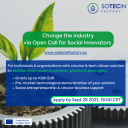
Exciting opportunity for all social innovators! SoTecIn Factory calls individuals and organizations in the agrifood, textiles, plastics & packaging industries with tech solutions based on circular economy & social innovation!
SoTecIn supports mission-driven circular ventures in leading the industry towards a low-carbon and circular economy transition through sustainable solutions, utilising higher R circular strategies. We provide up to 100k EUR in funding, help you to get to a pre-market demonstration, and provide capacity-building and mentorship.
Is this interesting for you or for someone in your network? Make sure to apply or share this with them!
Apply here: https://lnkd.in/eJnjfpDS
Find out more about the program: https://lnkd.in/exTueWti
Science-based targets for nature: Setting ambitious and effective goals for biodiversity

Preserving and reviving nature plays a crucial role in addressing climate change and biodiversity loss. But determining the starting point and measuring progress can be challenging.
Science-based targets offer a starting point to take concrete actions toward a sustainable future.
Setting SBTs enables companies to transform vague intentions into specific commitments. Imagine going from "We should do something with water" to "We aim to reduce water consumption in high-stress regions by 25% before 2030 through rainwater catchment and increased reuse." Science-based targets provide a clear direction and roadmap for achieving such goals.
If you’re interested in learning more about how science-based targets can drive positive change and contribute to a sustainable future, check out Metabolic's latest article. We explore SBTs and their impact on biodiversity and nature.
#Sustainability #ScienceBasedTargets
Transition Day 2023: An integral approach to the circular energy transition
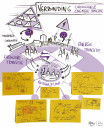
The transition towards a circular economy and the energy transition are both needed to reach a sustainable economy and society. The two are intertwined, as the materials needed for the energy transition (such as solar panels) are enormous and the speed of the energy transition is very dependent on the availability of sustainable raw materials, scarce earth metals and biomass. An integral approach is needed in the Metropolitan Region Amsterdam.
Metropolitan Region Amsterdam (MRA), City of Amsterdam, Province of North Holland (PNH) and Amsterdam Economic Board commit to actively stimulating this integral approach. In the session on the Transition day, we explored what the current connection or disconnection is between the two transitions in order to define the best next step.
Insights of the session
Led by Marielle de Bloois of Royal HaskoningDHV, all participants drew the current situation of both transitions. By explaining our drawings to each other, we all got new insights into the current situation and barriers between the two transitions. The main findings, visualised by Thomas van Daalen of Flatland are:
- There is enormous attention for the energy transition in terms of money, people and communication;
- There is only little attention for circular economy whilst the urgency is nothing less;
- People working on the transitions are working in separate teams with little connection whilst they are working on the same societal challenges;
- The circular economy is unknown and complex. If people want to connect the transitions they don’t know where to start;
- We have to rethink and link our narrative and connect people working on both transition and connect solutions.
The next steps
The session has led us to valuable new insights, and the participants are ready to take the next steps. For now, we have agreed on the following:
- The participants from the municipality of Haarlemmermeer will internally make a connection with their colleagues working on the energy transition.
- Eurofiber will dive deeper into available knowledge within their organisation.
- Edwin from the MRA will take the lead in setting up an approach with Province of North Holland, City of Amsterdam and Amsterdam Economic Board to make sure the topic of the circular energy transition will be part of the MRA agenda 2024.
- Amsterdam Smart City will keep the topic on the agenda and connect the right people around it.
Sign up for Smart City Barcelona updates

Amsterdam trade & Innovate is a member of Trade & Innovate NL that organizes trade missions for entrepreneurs from the Amsterdam Region (MRA).
In november Barcelona Smart City takes place with a special focus on mobility.
Sign up through this link to be included in the updates of the program!
Want to know even more?
Email Jorrit Saaltink, trade developer mobility: j.saaltink@amsterdam.nl
Metabolic CEO, Eva Gladek, was nominated for the Big Little Talk at Circularity 23!

Creating a sustainable planet for future generations is essential, and understanding our impacts on nature is a critical step toward achieving this goal.
Unfortunately, measuring impact on nature is complicated and requires specific expertise. We need to combine impact data with geospatial analysis to really see where the different activities along companies’ value chains are taking place, and how those impact nature and biodiversity locally.
By voting for Eva's Big Little Talk, you will Metabolic showcase the importance of nature assessments on the big stage at Circularity 23.
It takes only 1 minute, vote for our video in the link below.
#circularity23 #LinkByMetabolic #natureassessment
The new circular e-bike for Life

In Nederland worden jaarlijks een miljoen fietsen afval. Wij zijn van mening dat geen enkele fiets ontworpen mag zijn om na gebruik op de vuilnisbelt te belanden. We willen bewijzen dat het mogelijk is om de schade aan onze planeet te minimaliseren en tegelijkertijd de beste ervaring voor onze rijders te bieden.
De e-bike die is ontworpen om een leven lang mee te gaan. Opgebouwd uit hoogwaardige modules, (her)configureerbaar naar jouw wensen. Continu gemonitord, met service aan huis. Binnen een dag. Alles om een zorgeloze rit te garanderen, voor het leven.
Doe je mee?
New research: 6 strategies for building homes in the Netherlands within planetary boundaries
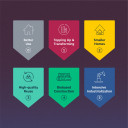
The Netherlands has a housing problem: Too many people, and not enough homes. The country plans to build 100,000 new homes each year through 2030.
But can the country build this much without exceeding our planetary boundaries?
In partnership with Copper8, NIBE, and Alba Concepts, Metabolic has proposed six strategies. When combined, these could reduce total CO2 emissions from construction by up to 33% and the use of raw materials by 40%.
Do you want to learn more? Find all the details in their newest research, which was presented last week in Amsterdam!
Centre of Expertise City Net Zero feestelijk gelanceerd!
Op 21 maart zijn we als City Net Zero feestelijk gelanceerd op de Knowledge Mile in Amsterdam. Lees hier een impressie terug over de dag en kom graag met ons in contact voor samenwerking!
Lees hier over de kick-off
Stay up to date
Get notified about new updates, opportunities or events that match your interests.

